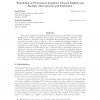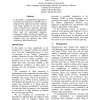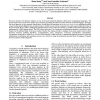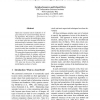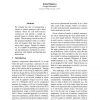18 search results - page 1 / 4 » A Computational Approach to Zero-pronouns in Spanish |
CORR
2011
Springer
12 years 8 months ago
2011
Springer
This paper evaluates the different tasks carried out in the translation of pronominal anaphora in a machine translation (MT) system. The MT interlingua approach named AGIR (Anaph...
ACL
2000
13 years 6 months ago
2000
In this paper, a computational approach for resolving zero-pronouns in Spanish texts is proposed. Our approach has been evaluated with partial parsing of the text and the results ...
LREC
2008
13 years 6 months ago
2008
Discourse structure and coherence relations are one of the main inferential challenges addressed by computational pragmatics. The present study focuses on discourse markers as key...
NAACL
2010
13 years 2 months ago
2010
Open-class semantic lexicon induction is of great interest for current knowledge harvesting algorithms. We propose a general framework that uses patterns in bootstrapping fashion ...
COLING
2010
12 years 11 months ago
2010
We consider the task of summarizing a cluster of related sentences with a short sentence which we call multi-sentence compression and present a simple approach based on shortest p...
